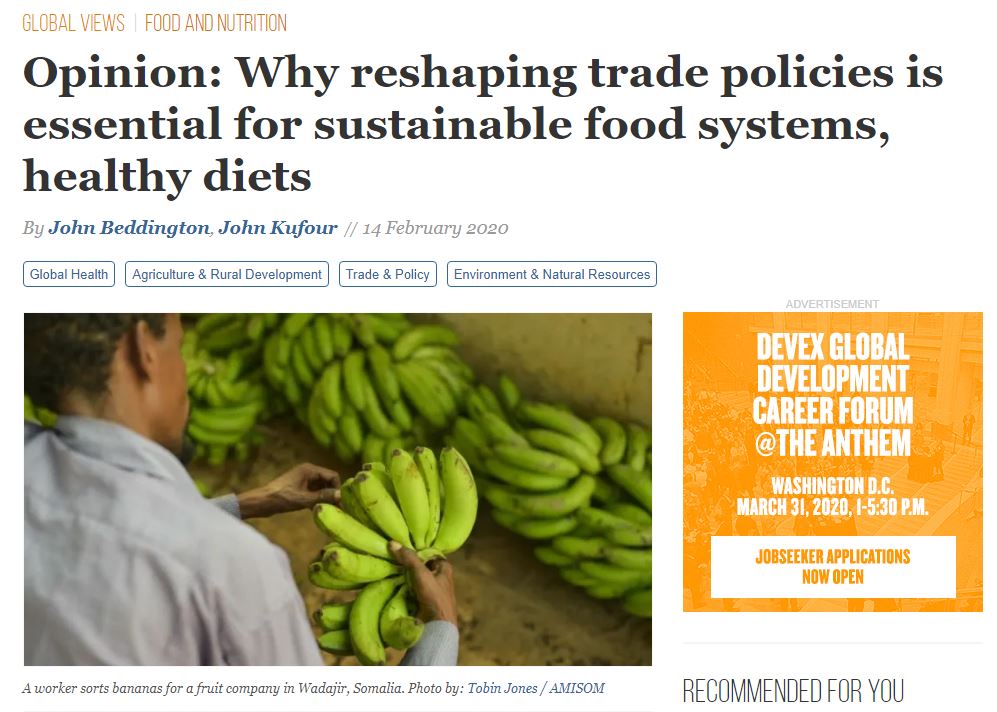Opinion: Why reshaping trade policies is essential for sustainable food systems, healthy diets

With its focus on climate change, the World Economic Forum’s annual meeting in Davos, Switzerland, that took place last month reviewed how food systems can better support both planetary and human health by providing safe, affordable, and nutritious diets for all.
While providing evidence to policymakers on this very issue is vital and has been on the agenda for many years, reconfiguring our food systems cannot happen without a reassessment of international trade policies.
Global trade in food has increased significantly in the past half-century. Trade is a critical component for ensuring a country’s food security, particularly in areas with limited natural resources or uncertain climate conditions.
Trade policies today are invariably driven by goals that have little to do with diets and nutrition, instead relating to issues such as economic growth, incomes, jobs, and foreign earnings. Consequently, they contribute to the growing disparity between the foods we should be eating to keep us healthy and the foods we are actually producing and trading globally.
For example, although the World Health Organization recommends that less than 5% of our diet come from sugar, it makes up 16% of global food production. Likewise, fruits and vegetables account for only 11% of global food production, despite recommendations that they should make up around half of our diet.
Our brief shows that much more can be done to take into account the effect of trade on diets and nutrition:
- Close attention should be paid to trade policies that influence the relative price of foods within domestic markets. Trade policies have the potential to shift incentives in ways that support higher consumption of particular foods. Highly perishable foods such as eggs and fresh milk cannot be easily traded over long distances, which limits the scope for low-cost imports to lower prices. But certain foods, such as meat and fish, can be processed in ways that improve their life span — including drying and freezing — allowing for easier trade. As such, meat and fish are cheap in Latin America and the Caribbean and also relatively affordable compared to other animal-source foods in sub-Saharan Africa, where calories from meat or fish are just five to six times as expensive as staple cereals.
- High priority should be given to trade policies that specifically help to increase the availability and to reduce the price of nutrient-rich foods. These foods are generally more expensive than nutrient-poor foods and tend to be less affordable to low-income consumers.
- Policymakers should be alert to the effects of trade policies on the availability and pricing of imports of ultraprocessed foods. Some processed foods, such as canned fruit and vegetables, may have relatively high standards of food safety and can be helpful in delivering healthy diets, but there is evidence that high consumption of ultraprocessed foods is associated with adverse health impacts, including noncommunicable diseases such as diabetes and heart disease.
- Policymakers should pay close attention to trade agreements that embody strong investor protections, as they can be particularly problematic. These protections may introduce substantial changes to regulatory regimes, enabling significant impacts on domestic policy.
- Food trade can be especially beneficial in managing price volatility and climate change risks. Food price volatility is a growing concern because of the effects of climate extremes on crop production. Governments should resist the imposition of export restrictions at times of sharp food price spikes and look instead to lowering tariffs and value-added tax to encourage trade flows.
Trade policies give access to a greater variety of more nutritious foods, but they can also enable people to buy a wide range of ultraprocessed foods. Ultraprocessed foods generally have longer shelf lives and are more easily transported, traded, and stored than nutrient-rich foods. The most widely traded food commodities are oil crops and sugar — both of which are key components of ultraprocessed foods. Globally, the economic cost of diabetes — one of the adverse health impacts associated with ultraprocessed foods — is predicted to increase to $2.5 billion by 2030. Trade forecasts for 2019 and 2020 indicate that 29% of oil crops and 30% of sugar are expected to be traded globally and that these will continue to grow.
Malnutrition affects every country in the world, driven by food systems that are damaging human health and environmentally unsustainable. Government policymakers, supported by evidence, need to come together to redress this situation. Trade policies can help countries better manage their food supply so that consumers are able to access diverse, available, affordable, and healthy diets that support economies, our health, and our planet.
This opinion editorial was originally published in Devex: https://www.devex.com/news/opinion-why-reshaping-trade-policies-is-essential-for-sustainable-food-systems-healthy-diets-96561
